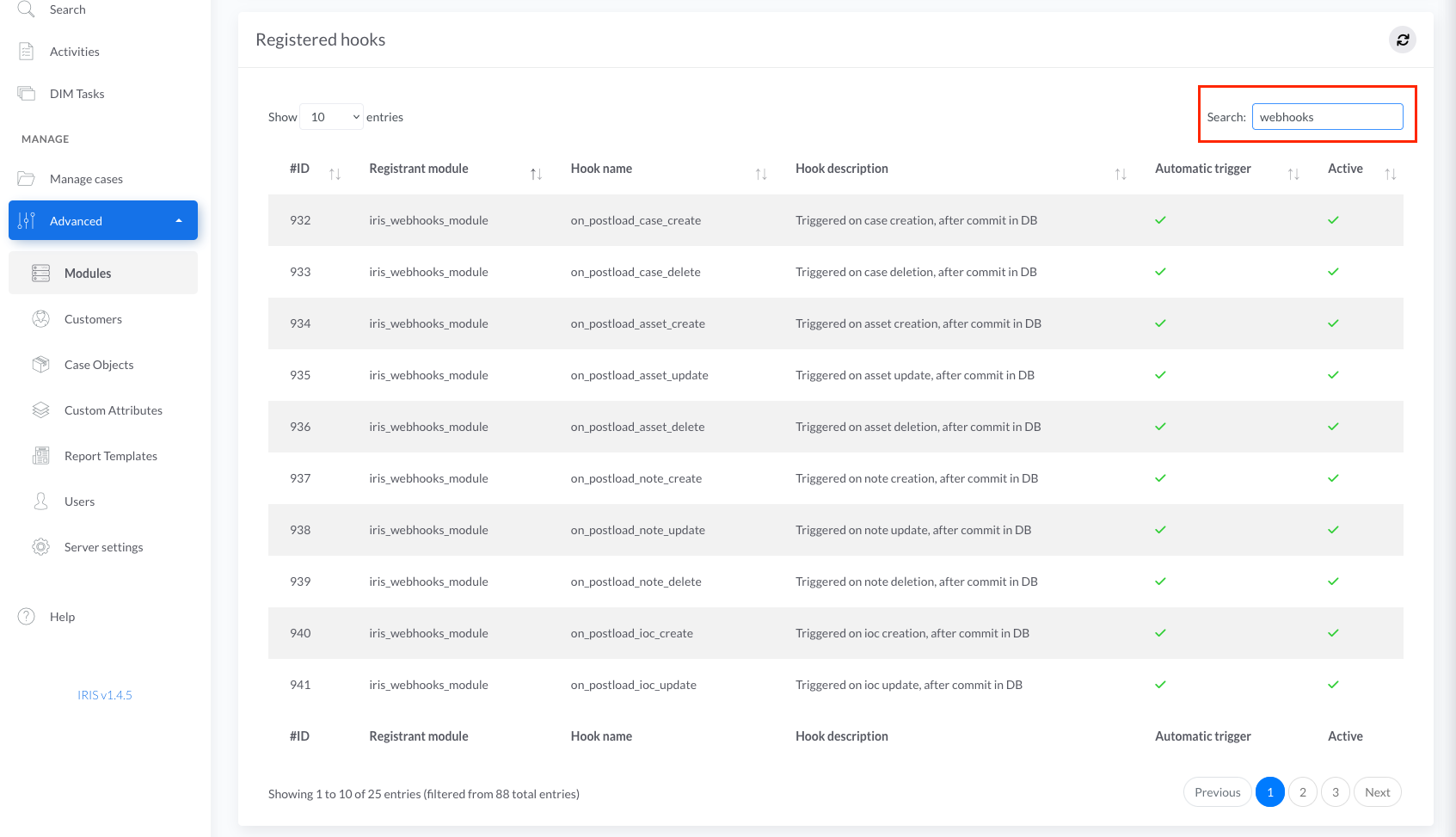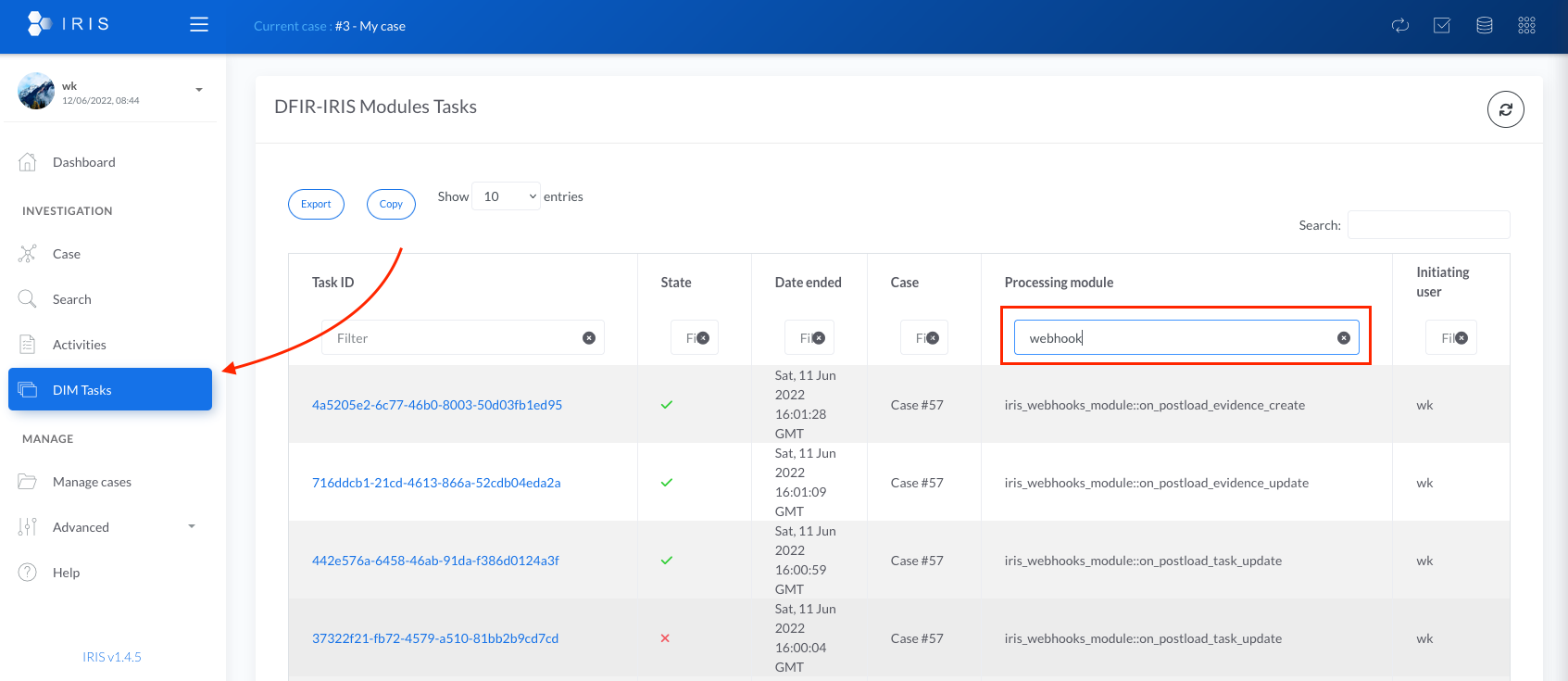Module IRIS Webhooks
This module offers webhooks support for IRIS. It can be configured to send almost any events to to an external service supporting webhooks, such as Discord, Slack or Microsoft Teams. It can also be used with automation tools such as Tines and Shufle to further automate IRIS.
The source code is available here.
Features
- Support multiple webhooks receivers thanks to its configurable payload
- Support multiple webhooks receivers at the same time
- Allows to send one, multiple or all events to an external service
Slack Example

Configuration
The expected configuration is a JSON file, following the structure :
{
"instance_url": "<IRIS_INSTANCE_URL>",
"webhooks": [
{
"name": "Name of the webhook for internal reference only",
"active": false,
"trigger_on": [<LIST OF HOOKS TO LISTEN TO>],
"request_url": "<URL OF THE WEBHOOK>",
"use_rendering": true,
"request_rendering": "<RENDERING TYPE OF THE MESSAGE>",
"request_body": {<BODY OF THE REQUET TO SEND>}
},
{
"name": "Another hook",
"active": false,
"use_rendering": false,
"trigger_on": [<LIST OF HOOKS TO LISTEN TO>],
"request_url": "<URL OF THE WEBHOOK 2>",
"request_rendering": "<RENDERING TYPE OF THE MESSAGE>",
"request_body": {<BODY OF THE REQUEST TO SEND 2>}
}
]
}
instance_url: Base URL of IRIS. This is used to set the links in the messageswebhooks: A list of JSON describing the webhooks For each webhook:name: Internal name of the webhook, this can be anythingactive: Optional - Set to false to disable the webhooktrigger_on: List of IRIS hooks for which the webhook should be triggered. Only theon_postload_XXhooks are supported. To enable a set of hooks without writing them all, the following keywords can be used :all: Includes allon_postloadhooksall_create: Includes allon_postload_XX_createhooksall_update: Includes allon_postload_XX_updatehooks
request_url: The URL provided by the webhook receiver. For instance for Slack : see how to get onerequest_rendering: URLs rendering may be specific from one receiver to another. The modules supports the following :markdown: Format the message as markdown. This can be used with Discord for instancemarkdown_slack: Format the message as markdown, with some specificities of Slack.html: Format the message as HTML.
request_body: The request body to be sent to the webhook receiver. Ifuse_renderingis true, then two markups can be used to set the content of the webhook. The request has to be in JSON format and is sent as-is after replacements of the markups.%TITLE%: Is replaced with name of the case and event title, e.g "[#54 - Ransomware] IOC created"%DESCRIPTION%: Description of the event, e.g "UserX created IOC mimi.exe in case #54" Ifuse_renderingis false, then a raw json representation of the object related to the hook is available. See examples for more details.
manual_trigger_name: The name of the manual trigger in the UI. This should be set if the registered hook is of typeon_manual_trigger. This name is displayed as a new menu option in the UI for the target object.use_rendering: Whether the data should be formated in Markdown or not. If set to false, then the request body field can use the raw data such asassets. This will result in a request with the body containing the assets JSON representation related to the call of the hook. See examples for more details.
Checking IRIS hooks registration
Each time a webhook is added, the module subscribes to the specified hooks. After saving the configuration, one can check the registration was successful by filtering the Registered hooks table (don't forget to refresh the table).

Examples without rendering
The following example is a combination of webhooks that can be used to further automate IRIS. It uses Tines as an example, but this is reproductible with any automation tool that can sent HTTP requests. A Tines story is created and is set up to receive a webhook, such as https://anothertest.tines.io/webhook/xxxx/xxxxx.
In this scenario, two IRIS webhooks are added:
- One to add an option to publish an IOC on MISP from the UI. This is an
on_manual_trigger_ioc_updatehook. - Another one to send a message on Mattermost each time a new case is created. This is an
on_postload_case_createhook.
We use the same Tines story and thus Tines webhook for both and dispatch the incoming request depending on its parameters.
TODO
Examples using rendering
The following is an example of combined webhooks configuration. It can be directly imported in the module with the import feature. Please note that after import, the configuration should be opened and change to match your URL webhook receiver.
Download webhooks combined configuration example
Discord
{
"instance_url": "https://iris.local",
"webhooks": [
{
"name": "Discord",
"trigger_on": [
"on_postload_ioc_create",
"on_postload_ioc_update",
"on_postload_note_create",
"on_postload_note_update"
],
"request_url": "https://discord.com/api/webhooks/XXXX/XXXX",
"request_rendering": "markdown",
"request_body": {
"embeds": [{
"description" : "%DESCRIPTION%",
"title" : "%TITLE%"
}]
}
}
]
}
Slack
{
"instance_url": "https://iris.local",
"webhooks": [
{
"name": "Slack",
"trigger_on": [
"all"
],
"request_url": "https://hooks.slack.com/services/<XXX>/<XXX>/<XXX>",
"request_rendering": "markdown_slack",
"request_body": {
"text": "%TITLE%",
"blocks": [
{
"type": "section",
"text": {
"type": "mrkdwn",
"text": "*%TITLE%*"
}
},
{
"type": "section",
"block_id": "section567",
"text": {
"type": "mrkdwn",
"text": "%DESCRIPTION%"
}
}
]
}
}
]
}
Troubleshooting
Webhooks receivers are expecting specific message formatting to successfully process them. Please carefully read their documentations.
The module only handles JSON POST for the moment. If the target webhook receiver needs another type of request, please contact us so we can add it.
As any IRIS module, IrisWebhooks is logged into DIM Tasks. You can check the status of the requests made in these. Go to DIM Tasks and then filter with webhooks. You can then check details info by clicking in the Task ID. More info might be available in the Docker worker logs depending on the situation.

Important Notes and know issues
- The module is in beta and will improve over time. More customization should be brought on the messages.
- For a complete experience, some features are missing on the server side - such as case info and user info passed to modules. They will be added in the next release and this module will be updated. For instance, IOC events do not hold case info, assets update events do not hold the user info who made the change.